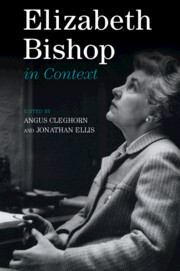Book contents
- Elizabeth Bishop in Context
- Elizabeth Bishop in Context
- Copyright page
- Contents
- Figure
- Contributors
- Acknowledgements
- Note on Referencing and Abbreviations
- Chronology
- Introduction
- Part I Places
- Part II Forms
- Part III Literary Contexts
- Part IV Politics, Society and Culture
- Chapter 18 War
- Chapter 19 The Cold War
- Chapter 20 Music
- Chapter 21 Psychoanalysis
- Chapter 22 Religion
- Chapter 23 Anthropology
- Chapter 24 Travel
- Part V Identity
- Part VI Reception and Criticism
- Works Cited
- Index
Chapter 21 - Psychoanalysis
from Part IV - Politics, Society and Culture
Published online by Cambridge University Press: 06 August 2021
- Elizabeth Bishop in Context
- Elizabeth Bishop in Context
- Copyright page
- Contents
- Figure
- Contributors
- Acknowledgements
- Note on Referencing and Abbreviations
- Chronology
- Introduction
- Part I Places
- Part II Forms
- Part III Literary Contexts
- Part IV Politics, Society and Culture
- Chapter 18 War
- Chapter 19 The Cold War
- Chapter 20 Music
- Chapter 21 Psychoanalysis
- Chapter 22 Religion
- Chapter 23 Anthropology
- Chapter 24 Travel
- Part V Identity
- Part VI Reception and Criticism
- Works Cited
- Index
Summary
Elizabeth Bishop and Sigmund Freud showed congruent interest in mental processes. Both considered dreams, symbolization, condensation, displacement, and projection; both anchored their conceptions in childhood experience. Bishop read and owned multiple volumes by Freud and Freud’s successors, Melanie Klein and Germaine Guex. Although her letters and notes generally dismiss psychoanalysis, late correspondence reflects more generously on her experience in treatment, which she sought initially as a cure for alcoholism and asthma. Despite her continuing affection and respect for Dr. Ruth Foster, Bishop had concluded that her sessions with Foster (1946–8) were a “fiasco,” although early poems and drafts reveal the impact of psychoanalysis. Our best evidence unfolds in three letters she wrote to Foster during 1947, which detail her history of maternal abandonment, childhood abuse and lesbian sexuality. These extraordinarily candid letters also narrate dreams and deconstruct key poems like “At the Fishhouses” and “The Moose” in psychoanalytic terms.
- Type
- Chapter
- Information
- Elizabeth Bishop in Context , pp. 245 - 255Publisher: Cambridge University PressPrint publication year: 2021

